Collaboratory update July 2022 | Ethiopia
News and updates from our Ethiopian colleagues
29 July 2022
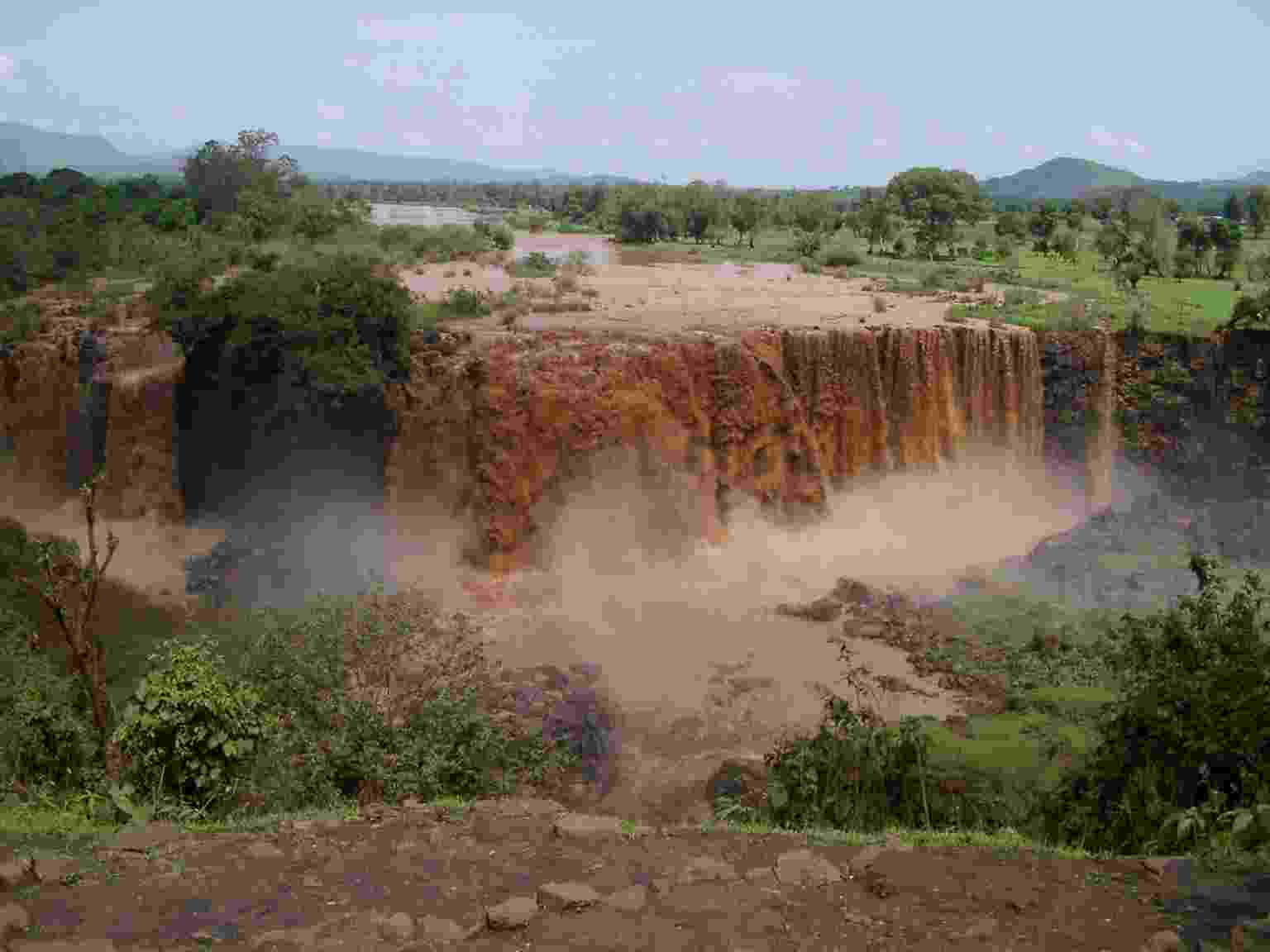

Abbay River during rainy season
With restrictions lifted and international travel possible again, our global team has been able to come together for face-to-face collaborative work. Colleagues from WLRC and Newcastle University (NU) have been working together on the CAMELS-ETH (Catchment Attributes and MEteorology for Large-sample Studies Ethiopia) dataset, completing data generation, database development, and the characterisation of 121 catchments found in the Abbay Basin. The CAMELS-ETH dataset is not only the first created in Ethiopia, but also the first in Africa overall, with other datasets including catchments in the United States, Chile, Britain, Brazil, and Australia. The Hub’s contribution to the CAMELS-Eth dataset consists of valuable data that can be used in a number of applications, for example, modelling water availability in different scenarios, understanding drought history and projections, and exploring climate change impacts on hydrological processes.
The team recently hosted a stakeholder training workshop on hydrological data management and hydrological modelling for water security in Addis Ababa. Over 30 people participated in the workshop, including government officials, graduate students, water practitioners, and researchers from agricultural institutes. Designed to build and strengthen capacity, the training took place over several days, covering CAMELS; concepts of hydrological modelling; and SHETRAN, a model for water flow, solute, and sediment transport in river catchments. The WLRC team has also developed CAMELS-Eth Explorer, Data Analytics, and Visualisation software, and presented a prototype to workshop participants.
In order to sustainably manage global water resources we must first understand their characteristics. Hub researchers are working on the characterisation of ground-surface water interaction, including wetlands, structure-controlled water bodies and groundwater resource potential, in the Central Rift Valley (CRV) Basin. The team has also carried out field visits to identify possible hotspots of groundwater potential, and understand agro-ecological variations and hydrogeological formations across the CRV. Surface and groundwater monitoring stations have been established, and data collection has been completed for groundwater models and several lake models. Consultations have also been held with local stakeholders on irrigation practices and water governance systems.
Work from the Hub is informing other research - colleagues at IWMI are involved in the Societal Development and Ecosystems Conservation in Sahelian Wetlands (SaWeL) project. As part of the ongoing work, the team organised a training event in Awassa on landscape approaches for managing land and water resources. Participants in the event came from a multitude of diverse backgrounds, representing communities and organisations at federal, regional, and local levels. During the event the team explored the concept of multiple water values and the importance of including them in decision making, using examples from Hub activities and research.

Participants in the hydrological modelling for water security workshop

Participants in the hydrological modelling for water security workshop

Figure 1: Hydrogeological map of CRV showing the geology, permeability and the NE-SW oriented fault swarms controlling groundwater flows

IWMI colleagues have also taken part in a workshop organised by the Environmental Protection Agency and UNDP Ethiopia office. During discussions, Hub colleagues raised the implications of overlapping governance arrangements on effective environmental management, and how important it is to establish appropriate coordination among different stakeholders. They also underlined the importance of including local and indigenous peoples and their knowledge - local people have long relied on practises that guide people-environment relations and sustainably manage natural resources.
Cross-collaboratory and co-produced research is one of the most important elements in the Hub’s interdisciplinary, systems approach. Following the award of an Adaptation Research Alliance (ARA) micro-grant, our Ethiopian and NU colleagues are working together with the Addis Ababa Water and Sewage Authority (AAWSA) on a narrative-based analysis of rainfall variability and trends. The newly created Addis Ababa Adaptation Network is exploring burning adaptation and water security issues facing Addis Ababa, and a paper on rainfall variability in Ethiopia is in progress. Last month, Dr Amare Bantider of WLRC took part in an event on Co-Production on Sustainable Land Systems. Dr Amare shared his perspectives on the co-production of knowledge, exploring the use of learning watersheds. (Watch the recording here).
As part of the Colombia-Ethiopia research collaboration - applying the Colombia team’s socio-ecological justice methodology to the Upper Awash River Basin in Ethiopia - colleagues conducted biological monitoring field work using miniSASS, a simple ‘stream assessment scoring system’ tool. The tool is useful in monitoring water sources over time, and assists with identifying pollution sources and where best to take local action to tackle the problem. During the fieldwork, benthic macroinvertebrates in the Akaki catchment were collected and taxonomic groups of macroinvertebrates were identified. Results from the data show that the Akaki Rivers are in very poor condition and seriously polluted. The team has also conducted assessments of social mapping and stakeholders’ analysis of water pollution in the Upper Awash Basin. Additionally, the team is exploring the social cartography research method developed by our Colombia Collaboratory as a participatory method.
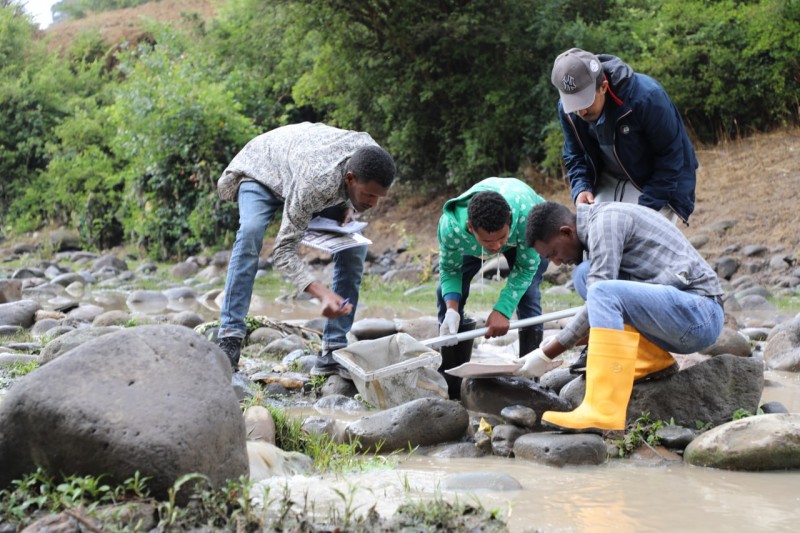
miniSASS training workshop - water quality monitoring exercises
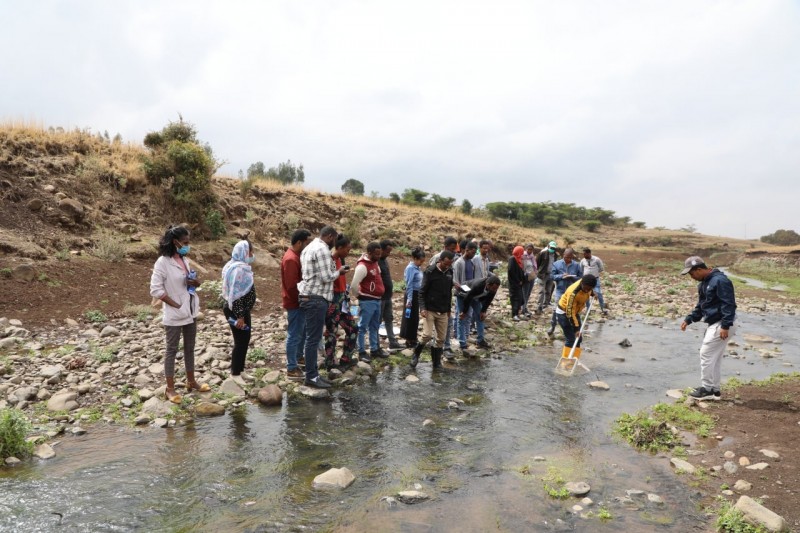
miniSASS training workshop - water quality monitoring exercises
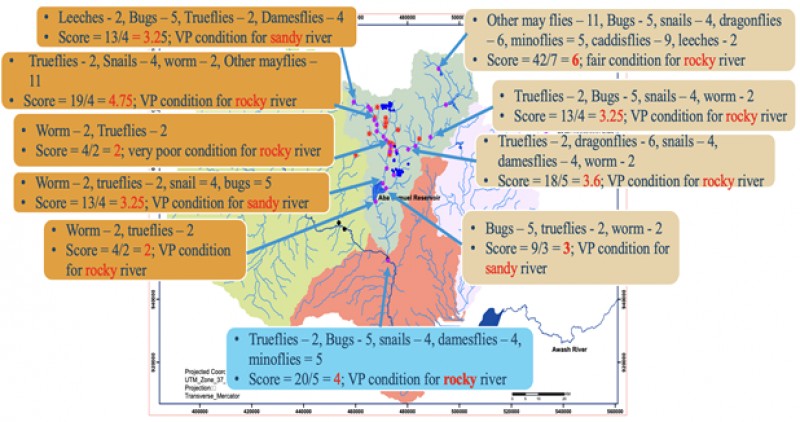
miniSASS tool - Akaki rivers health condition

Macroinvertebrate identification in the Akaki
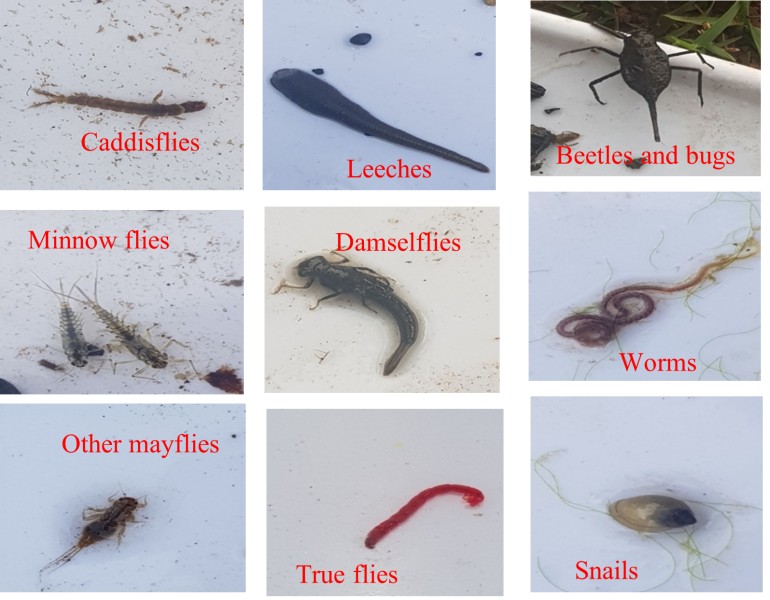
Macroinvertebrate identification in the Akaki
As part of the Hub’s commitment to capacity building, our Ethiopia water quality team held a stakeholder training workshop on miniSASS, developing science skills in students, teachers, experts, and professionals. Over several days more than 30 representatives from local, regional, and national authorities, and government bodies took part in the workshop. After exploring water quality dynamics of the rivers in the Upper Awash Basin and the role of the miniSASS tool in river water management, participants were able to join Hub colleagues in the field and take part in water monitoring exercises in the Awash catchment. Hub colleagues are now working together with the Ethiopian Ministry of Water and Energy (MoWE), and REACH at Oxford to establish biomonitoring stations, which will enable the MoWE water quality team to include miniSASS results in their SDG 6.3 reporting.
Community-based flood early warning systems are a crucial tool in mitigating the impacts of extreme weather events. Hub researchers at IWMI have carried out further studies and met with key informants at the Ethiopian Meteorology Institute and living in the Akaki catchment. Hub researchers at IWMI have been working together with the University of Leeds team on flood early warning systems as part of the Hub’s water risks and governance research.
Our Ethiopia team has been awarded funding from the Australian Centre for International Agricultural Research (ACIAR) for a project that will complement the Hub’s work addressing water quality degradation and its impact in the Akaki catchment. The project aims to contribute to the development of a safe and sustainable catchment ecosystem. Focusing on strengthening communication and collaboration between decision makers and stakeholders, the team will facilitate the generation of new knowledge, and the co-creation of efficient, participatory water quality management. The team will also pilot nature-based solutions to filtering contaminants from water systems in the catchment. Hub researchers recently attended a training of trainers workshop, held by the African Research Universities Alliance’s Water Centre of Excellence, where they were able to form connections and networks for further research.
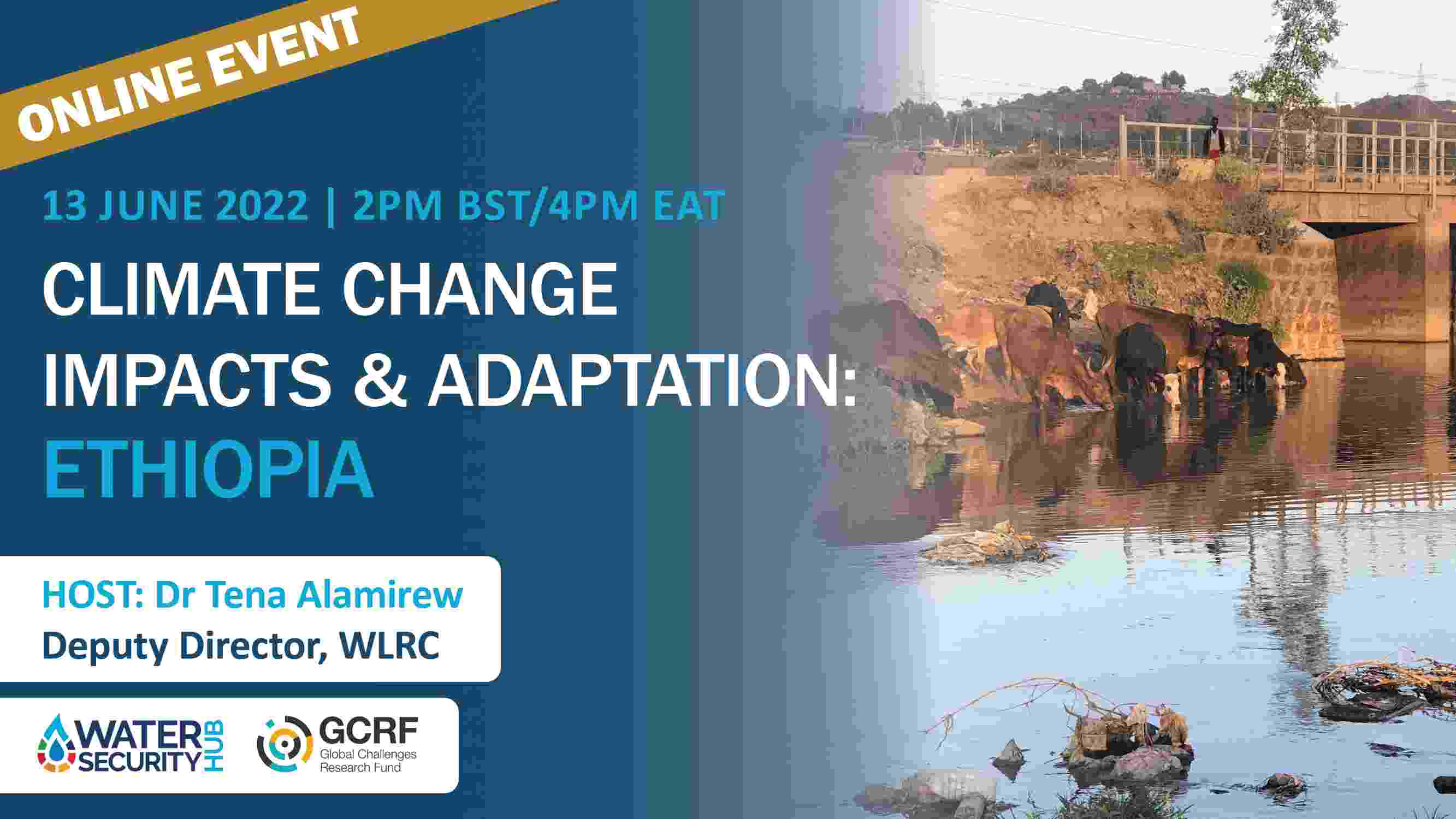

The latest instalment of the Hub’s climate change and adaptation webinar series was hosted by our Ethiopia Collaboratory, featuring guest speaker Dr Semu Moges from the University of Connecticut, and Professor Woldeamlak Bewket of WLRC. As well as highlighting the importance of assessing the whole hydrological cycle, and exploring how variability poses a challenge in climate change adaptation and mitigation, our speakers also covered the history and evolution of climate change policy in Ethiopia. Watch the webinar recording here.
Finally, congratulations to Dr Ermias Teferi from WLRC on receiving the Best Oral Presentation Award at the AAU Research Week 2022, for his presentation ‘Pathways to Improving Green Water Management for Enhancing Water and Food Security in the Abbay Basin’.



